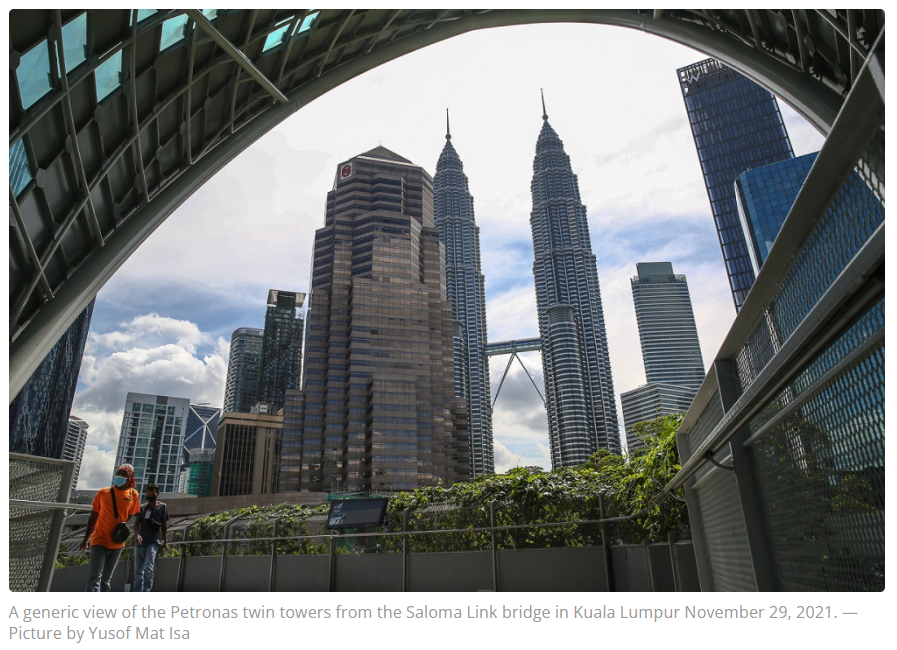World Bank sees Malaysia’s economy growing 5.8pc in 2022
KUALA LUMPUR, Dec 21 — Economic recovery in Malaysia is expected to gain momentum in 2022, with the World Bank projecting the economy to grow by 5.8 per cent, mainly driven by an acceleration in private consumption.
The Washington, DC-based institution said exports are projected to continue to expand, albeit at a slower pace, in line with the expected moderation in global trade growth and anticipation that it is to be broad-based, with recovery across all economic sectors.
According to the latest World Bank Malaysia Economic Monitor report titled “Staying Afloat” launched today, the forecast for the year ahead follows growth estimates of 3.3 per cent in 2021, which remains clouded by several downside risks, including new Covid-19 outbreaks and weaker-than-expected global and regional growth.
The World Bank noted that limited fiscal space remains a key challenge whereby the Federal Government revenue, which has been declining since 2013, is projected to reach 14.3 per cent of Gross Domestic Product (GDP) in 2022.
The report also said that rigid operating expenditures, namely emoluments, retirement charges, and debt service payments, have grown markedly over time and are expected to take up two-thirds of Federal Government revenue next year, increasing fiscal rigidity and crowding out discretionary spending.
“The pandemic has further constrained Malaysia’s already limited fiscal space. Government revenue is expected to decline while rigid expenditures remain high.
“Therefore, the government should accelerate efforts to rebuild fiscal buffers by collecting more and spending better,” said Ndiame Diop, World Bank country director for Brunei, Malaysia, the Philippines and Thailand.
Global growth is projected to decelerate to 4.3 per cent in 2022 from the 5.6 per cent forecast in 2021.
The World Bank said this reflects headwinds from the resurgence of Covid-19, continued supply disruptions and diminished macroeconomic support.
It further noted that growth is projected to moderate to 4.0 per cent in advanced economies next year (2021 forecast: 5.4 per cent) as policy support is gradually being wound down, although this will be partially offset by the continued release of pent-up demand.
Meanwhile, growth in emerging markets and developing economies (EMDEs) is projected to moderate to 4.7 per cent in 2022 (2021 forecast: 6.0 per cent).
Noting the Malaysian government’s intention to introduce a Fiscal Responsibility Act in 2022, the World Bank said it could pave the way for medium-term fiscal consolidation.
“However, in the short term, improving the targeting of social spending and at the same time phasing out generalised and regressive subsidies, such as fuel subsidies, will help raise the efficiency of government spending.
“Targeted social spending should remain a short-term priority due to the high degree of uncertainty over the health and economic outlook moving into 2022,” it said.
According to the High-Frequency Phone (HiFy) survey commissioned by the World Bank in Malaysia, the pandemic has exacerbated existing challenges faced by poor and vulnerable Malaysian households.
“The pandemic had worsened many socio-economic aspects of households, potentially adding to long-term inequalities, besides slowing future growth. Low-income, less-educated, and younger workers were more likely to have faced job losses during the pandemic.
“Informal workers were also among the worst hit and have been more susceptible to income losses. Moreover, despite receiving government assistance, households still had to use personal savings and reduce consumption to cope with the financial challenges,” the report said.
The World Bank said although the economy is gradually recovering, the progress is uneven, leaving low-income households and informally employed workers more vulnerable.
The survey also revealed learning gaps between children from different socio-economic groups that existed even before the pandemic.
School closures resulting from movement restrictions have widened these gaps as low-income households struggle with resources and support for their children undergoing home-based learning, it said.
The World Bank said to ensure Malaysia fulfils its growth potential in the next coming years, it is a very critical and opportune time for the country to address pre-existing gaps as well as newly emerged challenges from the crisis.
In the short term, the focus should be on maintaining financial support for the poor and vulnerable, achieving greater inclusivity, including facilitating learning for all children, it said.
“Over the longer term, measures should aim to address the shortcomings in the current social protection and education systems to make them more impactful in addressing poverty and inequality and more responsive to shocks.
“At the same time, it will be necessary to manage the pandemic’s lasting impact on livelihoods, well-being, and human capital development,” it added. — Bernama


 Thailand
Thailand




